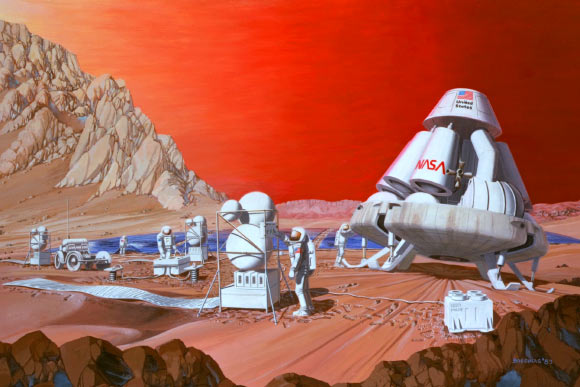According to new research from the University of California, Irvine, and the University of Nevada, exposure to galactic cosmic rays may have long-term adverse consequences to cognition throughout life; and performance decrements, memory deficits, and loss of awareness and focus during spaceflight may affect mission-critical activities.

Artist’s conception of a human mission to Mars. Image credit: Les Bossinas / NASA Lewis Research Center.
As NASA prepares for the first manned spaceflight to Mars, questions have surfaced concerning the potential for increased risks associated with exposure to the spectrum of highly energetic nuclei that comprise galactic cosmic rays. Previous animal studies have revealed an unexpected sensitivity of mature neurons in the brain to charged particles found in space.
In a new study, a team of scientists led by Prof Charles Limoli of the University of California used mice subjected to charged particle irradiation (fully ionized oxygen and titanium) to understand what happens to a brain during a long-term spaceflight.
The scientists found that exposure to highly energetic charged particles can cause significant damage to the central nervous system, resulting in cognitive impairments.
“This is not positive news for astronauts deployed on a two- to three-year round trip to Mars,” said Prof Limoli, who is the senior author of the paper in the journal Science Advances.
He and his colleagues found that exposure to these particles resulted in brain inflammation, which disrupted the transmission of signals among neurons.
Imaging revealed how the brain’s communication network was impaired through reductions in the structure of nerve cells called dendrites and spines. Additional synaptic alterations in combination with the structural changes interfered with the capability of nerve cells to efficiently transmit electrochemical signals.
Furthermore, these differences were parallel to decreased performance on behavioral tasks designed to test learning and memory.
“While cognitive deficits in astronauts would take months to manifest, the time required for a mission to Mars is sufficient for such deficits to develop,” Prof Limoli said.
“People working for extended periods on the International Space Station do not face the same level of bombardment with galactic cosmic rays, as they are still within the protective magnetosphere of the Earth. The irradiated particles that compose these galactic cosmic rays are mainly remnants of past supernova events.”
_____
Vipan K. Parihar et al. 2015. What happens to your brain on the way to Mars. Science Advances, vol. 1, no. 4, e1400256; doi: 10.1126/sciadv.1400256







